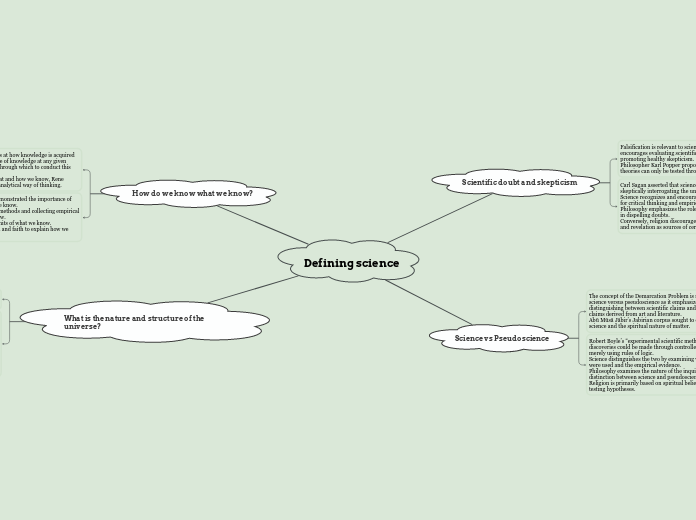
Falsification is relevant to scientific doubt and skepticism because it encourages evaluating scientific claims and testing hypotheses, promoting healthy skepticism.
Philosopher Karl Popper proposed that scientific ideas, claims, and theories can only be tested through falsification.
Carl Sagan asserted that science is a body of knowledge and a way of skeptically interrogating the universe.
Science recognizes and encourages doubt and skepticism as the basis for critical thinking and empirical testing.
Philosophy emphasizes the role of evidence and reliability of knowledge in dispelling doubts.
Conversely, religion discourages doubts and promotes reliance on faith and revelation as sources of certainty.
The concept of the Demarcation Problem is relevant to the inquiry of science versus pseudoscience as it emphasizes the importance of distinguishing between scientific claims and pseudoscience and other claims derived from art and literature.
Abū Mūsā Jābir’s Jabirian corpus sought to establish a balance between science and the spiritual nature of matter.
Robert Boyle’s “experimental scientific method” demonstrated that discoveries could be made through controlled experiments instead of merely using rules of logic.
Science distinguishes the two by examining whether scientific methods were used and the empirical evidence.
Philosophy examines the nature of the inquiries to provide the distinction between science and pseudoscience.
Religion is primarily based on spiritual beliefs and scripture, not on testing hypotheses.
Epistemology can help with how it looks at how knowledge is acquired and aids in our exploration of the nature of knowledge at any given time, epistemology is the greatest lens through which to conduct this question.
In order to question the accuracy of what and how we know, Rene Descartes emphasised the value of the analytical way of thinking.
Isaac Newton’s theory of gravitation demonstrated the importance of having observable facts to prove how we know.
Science depends on applying scientific methods and collecting empirical evidence to show we know what we know.
Philosophy examines the nature and limits of what we know.
Religion primarily appeals to revelation and faith to explain how we know what we know.
Boyle, R. (1660). The Sceptical Chymist. Retrieved from https://archive.org/details/scepticalchymis00boyluoft/page/n7/mode/2up Laudan, L. (1983). The Demise of the Demarcation Problem. In R. S. Cohen & L. Laudan (Eds.), Physics, Philosophy, and Psychoanalysis: Essays in Honor of Adolf Grünbaum (pp. 111-127). Springer.
Empiricism is the best philosophical lens to approach questions about nature and the structure of the universe.
Empiricism is the best philosophical lens to approach questions about nature and the structure of the universe.
Science relies on observation and experimentation in explaining the nature and structure of the universe,
Philosophy explores metaphysical and ontological questions to explain the nature and structure of the universe.
Religion depends on the spiritual interpretations of the creation theory to explain the nature and structure of the universe.